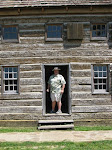If you mention "Ralphie" and "Red Ryder BB gun" in the same breath, I'd say most people could make an immediate connection with the film, A Christmas Story, and it's famous line that is the title of this entry. On the other hand, most people probably know very little about the remarkable personality behind that story. His name is Jean Shepherd. He was born on this day in 1921 on Chicago's south side and raised in nearby Hammond, Indiana.

Following service in World War II, Shepherd went on to a career in broadcasting, writing, film, and live performance. In radio, he was heard on a late night show for over twenty years - all unscripted - on New York's WOR where he entertained listeners with his humorous stories, interviews, and practical jokes. Shepherd hosted a television show for WOR as well, but he is best remembered in video narrating a number of productions based on his stories of growing up in the Midwest. Many of the scripts were so popular they later appeared in print.
Of course, his best known contribution to American humor is A Christmas Story, a compilation of stories and characters drawn from his earlier work. It was originally produced as a feature film in 1983 and made the transition into a television classic thanks to the persistence of Ted Turner. Almost any man born before 1950 can easily relate to much of Shepherd's/Ralphie's childhood. But many of the rites of passage to adulthood are timeless. The markers are a shared experience for every generation. Jean Shepherd was a genius at capturing them. And his skills as a narrator made him a natural at weaving the common threads into humorous and entertaining listening.
Fifteen years ago, Jean Shepherd died known primarily for one film produced in 1983 when he was 62. There's much more creativity to him than that. I hope more people come to enjoy his work as it ages into fine wine expressing one man's harvest of life in 20th century America.
Here is a taste of the raconteur at work:

No comments:
Post a Comment